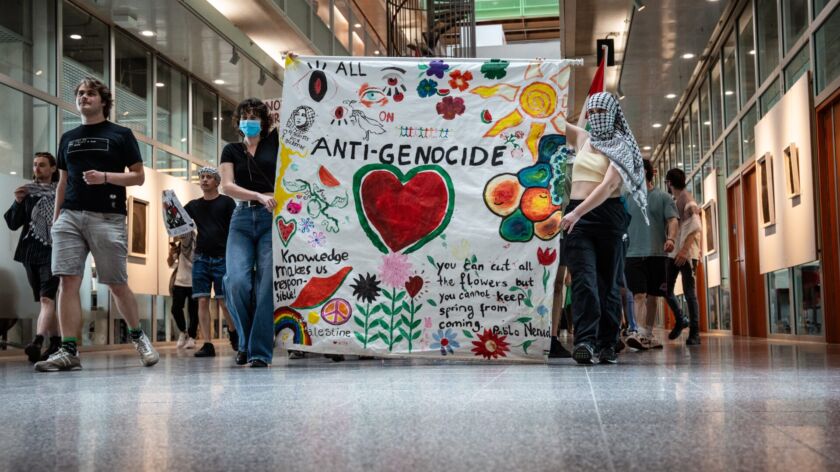Radboud University to launch new European partnership with Israeli universities in January
-
 Protestmars in het Huygensgebouw in mei 2024. Foto: Johannes Fiebig
Protestmars in het Huygensgebouw in mei 2024. Foto: Johannes Fiebig
Although the institutional ties between Radboud University and two Israeli universities were severed at the end of May, after that date, a research project is still starting involving Radboud University and three Israeli parties, among others. This is apparent from data from the European Commission.
Just over €300,000 will be awarded to Radboud University for a research project entitled Physics and Applications of Negative IONS that is due to start in January 2026. This money is part of the total €4.3 million awarded by the European Union to the project that is part of Horizon Europe, a research and innovation funding program.
The Swedish University of Gothenburg is coordinating the application, which involves 10 universities. In addition to Radboud University, these include the University of Groningen and the Israeli Hebrew University of Jerusalem.
Another 16 organisations are involved in the project as partners, including Israel’s Weizmann Institute of Science and the Israeli company Quantum Art Ltd.
The Nijmegen Faculty of Science and the HFML-FELIX department involved regard the project as a collaboration between individual scientists and emphasise that the research cannot be used by the military in what is known as dual use.
Horizon
As recently as May of this year, Radboud University put a halt to university-wide partnerships with Hebrew University, following the International Partnerships’ Committee’s conclusion that both Hebrew University and Tel Aviv University contributed to serious and systematic human rights violations.
However, the University did not wish to discontinue individual collaborations with Israeli scientists or collaborations within consortia involving Israeli organisations, as in the case of the above-mentioned Horizon project.
In reaching this decision, the Executive Board went against the request of members of the participational bodies and a group of Radboud University students and employees. Last week, the Royal Netherlands Academy of Arts and Sciences (KNAW) also called for Israel to be excluded from the European scientific cooperation programme.
Multilateral collaborations
The Partnerships Committee informed Vox, on behalf of its chair Lutgarde Buydens, that Horizon projects fall under the category of ‘multilateral collaborations within consortia’. The advisory committee has indicated that new collaborations can be entered into ‘provided the nature of the research requires it to take place in large-scale collaborations.’
Radboud University is connected to Israeli universities through several such partnerships. The Executive Board has stated several times that discontinuing these collaborations would amount to a breach of contract.
Tent camp
And yet, new applications were also submitted after students had set up a tent camp on the Nijmegen campus in May 2024, demanding that Radboud University cut its ties with Israeli universities and institutions. This concerns a total of six applications for a Horizon grant.
Sijbrand de Jong, Dean of the Faculty of Science, which will be the recipient of the relevant EU grant for the research on negative ions, says that the grant process was already under way before the advice to stop collaboration with Israeli universities was issued. ‘At the time, there was no formal reason to refuse this application,’ he says.
‘This is a bottom-up collaboration between scientists’
According to De Jong, in this case, in which Radboud University is awarded funding to appoint a PhD candidate, there is also no institutional cooperation. ‘In my opinion, this is a bottom-up collaboration between scientists, with the institutes only acting as an administrative and legal entity, signing the relevant documents so that the EU can process the application administratively.’
Political situation
Sandra Brünken of HFML-FELIX, the recipient of the Horizon grant, says the collaboration has led to an ongoing discussion within the Faculty and department. Her personal opinion is that cooperation on an individual basis with Israeli scientists should continue, ‘to foster scientific exchange, but also to have an open discussion on the political situation.’ HFML-FELIX has prepared a statement which can be found in full below.
Statement by HFML-FELIX:
‘First of all: HFML-FELIX will not be associated in any way with scientific collaborations that contribute to direct and specific violations of human rights or violations of academic integrity, more specifically regarding collaboration with the Israel Defence Forces (IDF).
HFML-FELIX will not enter into any collaborations in the context of university-wide partnerships, nor will it inter into direct collaboration with Israeli Universities at institute level, until further notice. We are currently not involved in any partnerships at this level.
Collaboration with individual scientists from around the world, including from Israel, which is not expected to lead to any dual use is and remains possible. Science is a communication tool we value highly.
Within HFML-FELIX, we had several discussions last week about Panions, an EU-funded Doctoral Network, of which the Hebrew University of Jerusalem is part.
Based on available information and interviews with the individual scientists involved in Israel, we have given careful consideration to the question of whether this partnership does not involve human rights or academic integrity violations, and whether the individuals in question are not involved in human rights violations.
We have concluded from our investigation that this is not the case and that we will proceed with the collaboration within Panions. It goes without saying that we will continue to monitor geopolitical developments, assess our assumptions if the situation changes, and take action if necessary.’



